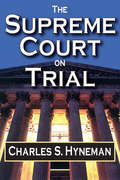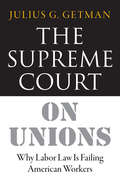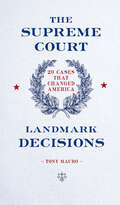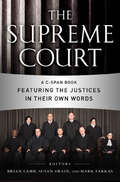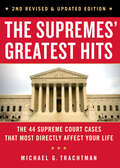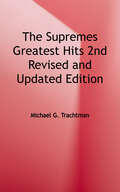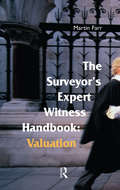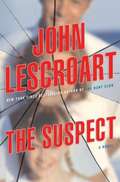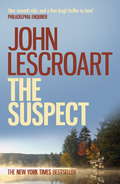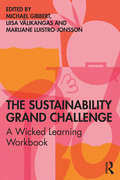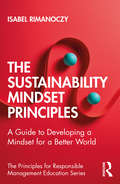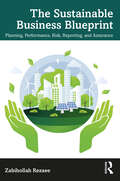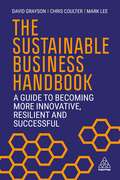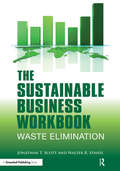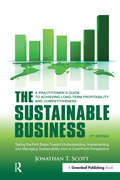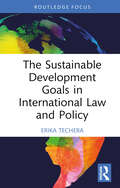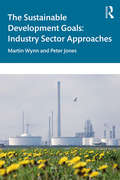- Table View
- List View
The Supreme Court of Pennsylvania: Life and Law in the Commonwealth, 1684–2017 (G - Reference, Information and Interdisciplinary Subjects)
by John J. HareEstablished in 1684, over a century before the Commonwealth, Pennsylvania’s Supreme Court is the oldest appellate court in North America. This balanced, comprehensive history of the Court examines over three centuries of legal proceedings and cases before the body, the controversies and conflicts with which it dealt, and the impact of its decisions and of the case law its justices createdIntroduced by constitutional scholar Ken Gormley, this volume describes the Supreme Court’s structure and powers and focuses at length on the Court’s work in deciding notable cases of constitutional law, civil rights, torts, criminal law, labor law, and administrative law. Through three sections, “The Structure and Powers of the Supreme Court,” “Decisional Law of the Supreme Court,” and “Reporting Supreme Court Decisions,” the contributors address the many ways in which the Court and its justices have shaped life and law in Pennsylvania and beyond. They consider how it has adjudicated new and complex issues arising from some of the most notable events and tragedies in American history, including the struggle for religious liberty in colonial Pennsylvania, the Revolutionary War, slavery, the Johnstown Flood, the Homestead Steel Strike and other labor conflicts, both World Wars, and, more recently, the dramatic rise of criminal procedural rights and the expansion of tort law. Featuring an afterword by Chief Justice Saylor and essays by leading jurists, deans, law and history professors, and practicing attorneys, this fair-minded assessment of the Court is destined to become a criterion volume for lawmakers, scholars, and anyone interested in legal history in the Keystone State and the United States.
The Supreme Court on Trial
by David ListokinAlthough it was written at a time of national self-criticism, The Supreme Court on Trial remains a classic examination of the place of the Supreme Court in the American political system. When originally published, the American people were engaged in a severe examination of their basic commitments, their way of life, and the direction they appeared to be going. The contemporary literature--over the air, in newspaper editorials and columns, in books and articles--was heavy with protest, admonition, and exhortation. Although the times are different, the issues raised in this volume continue to be important.The American system exalts the American citizen as common man, with claims to the dignity of citizens, and pleas for securing their civil rights. At the same time, citizens are criticized for their cultural provincialism, fear of intellectual endeavor, and adoption of conformity. Political institutions are not immune from such evaluations. We have created Hoover commissions to study the national administrative system; the Electoral College has been the subject of persistent scrutiny since World War II. There have been demands for reconstitution of our state lawmaking bodies. What links the concerns current at the time of original publication of this volume and concerns today most obviously are deep concern we now display for the character and quality of our public school curriculum and for the administrative structure which maintains and manages our schools. The role of the Supreme Court in these concerns is evident.The purpose of the book is to examine critically the place of the Supreme Court in our political system and to improve the public understanding of what the Supreme Court does, how its acts have been received, and how its way of influencing public policy is related to other methods of making public policy.
The Supreme Court on Unions: Why Labor Law Is Failing American Workers
by Julius G. GetmanLabor unions and courts have rarely been allies. From their earliest efforts to organize, unions have been confronted with hostile judges and antiunion doctrines. In this book, Julius G. Getman argues that while the role of the Supreme Court has become more central in shaping labor law, its opinions betray a profound ignorance of labor relations along with a persisting bias against unions. In The Supreme Court on Unions, Getman critically examines the decisions of the nation's highest court in those areas that are crucial to unions and the workers they represent: organizing, bargaining, strikes, and dispute resolution. As he discusses Supreme Court decisions dealing with unions and labor in a variety of different areas, Getman offers an interesting historical perspective to illuminate the ways in which the Court has been an influence in the failures of the labor movement. During more than sixty years that have seen the Supreme Court take a dominant role, both unions and the institution of collective bargaining have been substantially weakened. While it is difficult to measure the extent of the Court’s responsibility for the current weak state of organized labor and many other factors have, of course, contributed, it seems clear to Getman that the Supreme Court has played an important role in transforming the law and defeating policies that support the labor movement.
The Supreme Court: 20 Cases that Changed America
by Tony MauroA concise, informative guide to the twenty most momentous Court rulings in American history, including excerpts from the written decisions and dissents. The legislative branch of government creates laws, and the executive branch signs and enforces them. But how does America make sure these laws don’t run afoul of the Constitution? That responsibility lies with the final arbiters: the nine justices of the Supreme Court. Every year, thousands of contentious cases are submitted to the court; only about eighty of them are heard. Out of those cases, many are remembered only by the people directly involved. But over the years, many cases heard by the Supreme Court have gone on to affect the lives of many, or even all, American citizens. In The Supreme Court: Landmark Decisions, veteran court reporter Tony Mauro picks out the twenty most momentous Supreme Court cases in United States history. In his reviews, from Marbury v. Madison, the 1803 case that first affirmed the Supreme Court’s status as the country’s final legal arbiter, to Obergefell v. Hodges, the 2015 case that legalized same-sex marriage, Mauro summarizes each case and includes cogent summaries of the justices’ decisions, as well as notable dissents. From a journalist noted by the New York Times for “explaining complex legal issues to laymen without sacrificing accuracy and subtlety,” The Supreme Court: Landmark Decisions serves as your quick, concise, and informative guide to one of the most important, and sometimes least-understood, institutions in the nation.
The Supreme Court: A C-SPAN Book Featuring the Justices in their Own Words
by Brian Lamb Susan Swain C-Span Mark FarkasThe Supreme Court grew out of an historic opportunity to interview all of the living Supreme Court justices for a C-SPAN feature documentary about the Court, the only time that the nine sitting members and their retired colleagues have granted interviews to a single television network. Eleven of those interviews-the entire current court, including the newest member, Justice Elena Kagan-are gathered here in this singular collection. In their conversations with the justices, Brian Lamb and Susan Swain bring readers into a fascinating world to which few have had access. Chief Justice John Roberts talks about the role of the Court in society, his role as chief justice, and the process of deciding cases. Justice Stephen Breyer takes us on a private tour of his chambers and describes the differences between the Court and the Congress. And new Justices Sonia Sotomayor and Elena Kagan reflect on their first impressions of the job. Through these encounters, the justices' personalities, intellects, and devotion to the Court emerge. Enriching this material are Mark Farkas's interviews with journalists, court historians, and other experts on the Court. Reporters Joan Biskupic and Lyle Denniston discuss the Supreme Court in action and the impact of a new member of the Court. Clerk of the Supreme Court William Suter illuminates the traditions of the Court. Historian James O'Hara discusses the Supreme Court building and its history. Former Solicitor General Drew Days III and attorney Maureen Mahoney describe the experience of facing the justices in fast-paced oral arguments. The Supreme Court offers readers a rare window into the nation's highest court through the eyes of those who serve there. It is absorbing reading for anyone interested in this vital and powerful institution.
The Supreme Court: Into the Third Century
by Richard Bernstein Jerome AgelA history of the Supreme Court which explores such ideas as judicial review and federalism, introduces people who have shaped our history and our law, and assesses the modern Supreme Court.
The Supreme Court’s New Workplace: Procedural Rulings and Substantive Worker Rights in the United States
by Joseph A. SeinerThe US Supreme Court has systematically eroded the rights of minority workers through subtle changes in procedural law. This accessible book identifies and describes how the Supreme Court's new procedural requirements create legal obstacles for civil-rights litigants, thereby undermining their substantive rights. Seiner takes the next step of providing a framework that practitioners can use to navigate these murky waters, allowing workers a better chance of prevailing with their claims. Seiner clearly illustrates how to effectively use his framework, applying the proposed model to one emerging sector - the on-demand industry. Many minority workers now face pervasive discrimination in an uncertain legal environment. This book will serve as a roadmap for successful workplace litigation and a valuable resource for civil-rights research. It will also spark a debate among scholars, lawyers, and others in the legal community over the use of procedure to alter substantive worker rights.
The Supremes' Greatest Hits, 2nd Revised & Updated Edition: The 44 Supreme Court Cases That Most Directly Affect Your Life
by Michael G. TrachtmanCan the government seize your house to build a shopping mall? Can it determine what control you have over your own body? Can police search your cellphone? The answers to those questions come from the Supreme Court, whose rulings have shaped American life and justice and allowed Americans to retain basic freedoms such as privacy, free speech, and the right to a fair trial. Especially relevant in light of Justice Antonin Scalia&’s passing, as President Obama gears for a fight over nominating his successor, and as we prepare to elect a new president who may get to appoint other justices, the revised and updated edition of Michael G. Trachtman&’s page-turner includes ten important new cases from 2010 to 2015. In addition, a special section features analyses of the new term rulings planned for June 2016. The new cases include:Citizens United v. Federal Election Commission (2010), which restricts the right of governments to limit campaign contributions by corporations and unions; Burwell v. Hobby Lobby (2014), which allows a religious exemption from the Affordable Care Act requirement that corporations pay for contraceptive coverage for their employees; Riley v. California (2014), which ruled that police need warrants to search the cellphones of people they arrest; and Obergefell v. Hodges (2015), which ruled that the Constitution guarantees a right to same-sex marriage.
The Supremes' Greatest Hits: The 44 Supreme Court Cases That Most Directly Affect Your Life
by Michael G. TrachtmanCan the government seize your house to build a shopping mall? Can it determine what control you have over your own body? Can police search your cellphone? <p><p>The answers to those questions come from the Supreme Court, whose rulings have shaped American life and justice and allowed Americans to retain basic freedoms such as privacy, free speech, and the right to a fair trial. <p><p>Especially relevant in light of Justice Antonin Scalia's passing, as President Obama gears for a fight over nominating his successor, and as we prepare to elect a new president who may get to appoint other justices, the revised and updated edition of Michael G. Trachtman's page-turner includes ten important new cases from 2010 to 2015. In addition, a special section features analyses of the new term rulings planned for June 2016.
The Surveyors' Expert Witness Handbook
by Martin FarrThis book is an invaluable guide for those providing expert evidence on valuations of commercial properties – including civil actions, rent review arbitrations, lands tribunal cases and rating appeals.The object of the book is to provide the commercial property valuer with a detailed introduction to providing expert evidence in a litigation context, the rules, requirements and the pitfalls for the unwary. Particular trouble has been taken to emphasise the need for quality evidence based on relevant experience which is objective, unbiased, independent, and of sufficient quality to resist challenges before the courts, tribunals and arbitrators. This handbook will help the practitioner start off on the right course and provide forewarning of the issues which he or she is likely to face, leading to greater professional awareness and to higher standards of valuation expert evidence in all commercial property fields.
The Suspect (Dismas Hardy #11)
by John LescroartWhen a marriage headed for divorce ends in homicide, no alibi can clear the surviving spouse. But the right attorney just might...
The Suspect: A dark and gripping murder mystery (Ditmas Hardy Ser.)
by John LescroartInnocence is no guarantee of justice...John Lescroart, bestselling author of the Dismas Hardy series, returns with a gripping standalone murder mystery, The Suspect. Perfect for fans of John Grisham and Steve Martini. 'One smooth ride, and a fine legal thriller to boot' - Philadelphia Enquirer Dr. Caryn Dryden is found dead in her hot tub, and homicide inspector Devin Juhle targets a suspect close to home: her husband, Stuart Gorman. After all, Caryn recently asked for a divorce ... and Stuart stands to gain millions in insurance. His alibi-that he was at his cabin on Echo Lake that weekend-doesn't keep him out of hot water. But maybe a shrewd attorney will. Gina Roake, a partner in Dismas Hardy's firm, is eager to take on such a high-profile case, especially when the client's innocence seems so easy to prove. Yet the more time she spends with Stuart, the more complicated her feelings become; she feels strangely drawn to him at first, then has to confront the possibility of a dark history lurking in his past. Desperate to know the truth, Gina calls in Wyatt Hunt to investigate. But as the damning facts accumulate, and as the rabid press concludes that Stuart is guilty, Gina must face the possibility that Stuart may not find mercy in the courtroom either.
The Suspect: An Olympic Bombing, the FBI, the Media, and Richard Jewell, the Man Caught in the Middle
by Kevin Salwen Kent AlexanderThe “intensively reported and fluidly written” true-crime account of the heroic security guard accused of the 1996 Centennial Olympic Park bombing (Wall Street Journal).On July 27, 1996, security guard Richard Jewell spotted a suspicious bag in Atlanta’s Centennial Olympic Park, the town square of the 1996 Summer Games. Inside was a bomb, the largest of its kind in FBI and ATF history. The bomb detonated amid a crowd of fifty thousand people. But thanks to Jewell, it only wounded 111 and killed two, not the untold scores who would have otherwise died. Yet seventy-two hours later, the FBI turned Jewell from a national hero into their main suspect. The decision not only changed Jewell’s life, it let the true bomber roam free to strike again. Today, most of what we remember of this tragedy is wrong.In a triumph of investigative journalism, former U.S. Attorney Kent Alexander and reporter Kevin Salwen reconstruct events before, during, and after the bombing. Drawn from law enforcement evidence and the extensive personal records of key players—including Richard himself—The Suspect, is a gripping story of domestic terrorism and an innocent man’s fight to clear his name.
The Suspicion Series Volume One: Suspicion of Innocence, Suspicion of Guilt, and Suspicion of Deceit (The Suspicion Series)
by Barbara ParkerThree taut mysteries in the Edgar Award–nominated crime thriller series by a New York Times–bestselling author. Gail Connor is a fast-rising attorney in a major Miami law firm. She and fellow lawyer Anthony Quintana work hard to ensure justice for their clients, and continue to investigate crimes around town while off the clock. Suspicion of Innocence: Gail is about to make partner in her Miami law firm when her life takes a sudden turn. She discovers her sister’s murdered body and soon realizes she’s the prime suspect. Gail must fight for her life as she gets a firsthand look at the dark underside of the legal system. Suspicion of Guilt: Gail’s been handed the biggest case of her life—a career maker that will guarantee partnership at her firm. But when she discovers suspected forgery is only the top layer of a brutal murder cover-up, she’s plunged deep into conspiracy and deadly risk. Suspicion of Deceit: Gail is newly engaged to her colleague Anthony when disturbing revelations about his past come to light. It seems, as a rebellious and idealistic youth, he traveled to Central America and became entangled in the cover-up of a violent tragedy in the Cuban expatriate community. Now, to keep that secret, someone is willing to kill . . . over and over again.
The Suspicion Series Volume Three: Suspicion of Madness and Suspicion of Rage (The Suspicion Series)
by Barbara ParkerGet twice the thrills in these two masterful crime thrillers in the New York Times–bestselling author&’s Edgar Award–nominated series. &“Miami&’s tempestuous legal sweethearts&” Gail Connor and her fiancé, Anthony Quintana, may have a volatile relationship, but when it comes to solving crimes on the dark side of sunny Florida, they must see eye to eye (Publishers Weekly). Suspicion of Madness: Anthony is in the Florida Keys to clear a former client&’s stepson of murder. But the simple case takes an unexpected turn when the boy attempts suicide. As a tropical storm looms, Florida&’s mean season will trap Anthony and Gail in a tinderbox of explosive surprises. &“Sizzling . . . smoldering suspense.&”—Vero Beach Press Journal (Florida) Suspicion of Rage: After finally tying the knot, Gail and Anthony travel to Havana to introduce her to the Cuban branch of his family. But when Anthony is asked to persuade his brother-in-law to defect, the newlyweds find themselves up against a radical underground group, an assassination plot, and a shattering secret from Anthony&’s past. &“Takes Parker to a new level . . . a strong political thriller.&” —The Miami Herald
The Suspicion Series Volume Two: Suspicion of Betrayal, Suspicion of Malice, and Suspicion of Vengeance (The Suspicion Series)
by Barbara ParkerAn electrifying trio of thrillers in the Edgar Award–nominated series by the New York Times–bestselling author. For Miami’s “hot-blooded legal duo,” Gail Connor and fellow attorney Anthony Quintana, personal passions collide with professional duties as they take on the city’s most dangerous cases (Library Journal). Suspicion of Betrayal: Gail Connor thinks she has a booming law practice, a perfect home, and a forthcoming marriage to a top criminal lawyer. But her perfect life is threatened when menacing phone calls and threats to her young daughter uncover secrets from her past. Suspicion of Malice: Gail and Anthony’s shaky relationship is now further divided by an explosive case. Anthony’s daughter wants Gail to defend her boyfriend against murder charges. Two things stand in Gail’s way: a reluctant witness, and the witness’s lawyer—Anthony. As a conflict of interest heats up, a young man’s life is on the line. To win, who’ll cross it? Suspicion of Vengeance: Aiding the appeal of a man convicted of murder ten years earlier, Gail discovers plenty of justice-system malfeasance—as well as a link between the slaying and the skeletons in her own family closet.
The Sustainability Grand Challenge: A Wicked Learning Workbook
by Edited by Michael Gibbert, Liisa Välikangas and Marijane Luistro-JonssonHow do universities tackle wicked sustainability challenges faced by society? The Wicked Learning Workbook is a toolkit for setting up and running an interdisciplinary master-level course in the context of real-world problems such as food waste and loss. The book offers a new pedagogical approach that we call 'wicked' because it is unorthodox, ambitious, and tackles complex problems that won’t go away. The pedagogy is also international at the course level rather than the conventional exchange semester, enabling institutions to embed international approaches to their core teaching. The Wicked Learning Workbook speaks directly to academics who are looking for solutions that provide stimuli for research and teaching while giving students an innovative, international learning experience. The approach develops student understanding of the UN Sustainable Development Goals as broad-scale societal issues which are difficult, if not impossible, to ‘solve’. An important outcome of this approach is the laboratory-style classroom that creates opportunities for faculty, students and companies to co-create solutions that are immediately implementable. The resulting methodology is based on industry–university collaboration (such as IKEA and Nestlé). The methodology is of interest to corporate leaders pursuing sustainability goals and business transformation. Achieving sustainability requires cross-boundary, cross-disciplinary, experimental approaches that allow for scalability. Wicked problems can only be tackled with wicked solution approaches.
The Sustainability Mindset Principles: A Guide to Developing a Mindset for a Better World (The Principles for Responsible Management Education Series)
by Isabel RimanoczyAs we increase our awareness of the planetary challenges and how they intersect with the discipline or profession we choose to focus on, we have put our attention on the external forces and impacts. What remains untouched however is the set of beliefs, values, assumptions, mental processes, and paradigms that we hold and share: our mindset. But how do we change a mindset? This book is the first to introduce the 12 Principles for a Sustainability Mindset, presenting educators with a framework that makes it easy to include them into teaching plans and lessons of any discipline. Written in a very clear and practical way, the book provides examples, checklists, tips, and tools for professionals and educators. It transforms the development of a much-needed mindset for sustainability into an accessible, fun and intuitive task. The book is written with educators from a variety of disciplines in mind, including but not limited to management educators, coaches, and trainers. No other book comes close to providing such a well-organized and solid way of starting to shift our mindsets in the direction of sustainability.
The Sustainable Business Blueprint: Planning, Performance, Risk, Reporting, and Assurance
by Zabihollah RezaeeUnderstanding how to build and manage a sustainability business plan has become a business imperative as investors demand, regulators require, and stakeholders increasingly expect companies to report their financial economic sustainability performance (ESP) and non-financial environmental, social, and governance (ESG) sustainability information. This book provides both the rationale for and key practical steps in how to approach business sustainability factors of planning, performance, risk, reporting, and assurance.This comprehensive book covers all the areas that a business would need to embed, articulate, and execute a strategy of profit-with-purpose in promoting shared value creation for all stakeholders. It addresses drivers, sources, and international guidelines (GRI, IIRC, SASB, FASB, PCAOB, IAASB, ISSB) for prioritising business sustainability factors, and establishing the link between ESG performance and financial performance. It presents key performance indicators (KPIs) of ESP and ESG dimensions of sustainability performance. It also provides templates for performance, risk, and disclosure; presenting cases and examples of why to disclose ESG performance, what to disclose, and where and how to disclose ESG performance information.For businesses wanting a detailed understanding of how to deliver on these important areas, including boards of directors, senior management, financial officers, internal auditors, external auditors, legal counsel, investors, and regulators, this book is an invaluable resource.
The Sustainable Business Handbook: A Guide to Becoming More Innovative, Resilient and Successful
by David Grayson Chris Coulter Mark LeeThe case for business sustainability has already been made; organizations can no longer ignore the issue when climate change affects supply chains and customer expectations require them to take action. It has also been proven that businesses operating sustainably drive innovation, build brand value and are more profitable.It is therefore time to shift the conversation from the 'why' of business sustainability to the 'how'. The Sustainable Business Handbook is a practical 'how-to' guide which aims to demystify jargon and provide practical tools and tips for busy managers. Rather than preaching the importance of sustainability, it cuts straight to how businesses can become more resilient and successful in the long term by becoming more sustainable.This indispensable book is based around twenty top tips for transforming your business and is interspersed with a range of individual profiles and case studies of organizations successfully embracing sustainability. With guidance on defining your organizational purpose, engaging stakeholders and creating the right culture, The Sustainable Business Handbook outlines how to shift Corporate Responsibility from being a bolt-on to business operations to being a source of innovation and new business, as well as societal good.
The Sustainable Business Workbook: A Practitioner's Guide to Achieving Long-Term Profitability and Competitiveness
by Jonathan T. Scott Walter R. StahelWhether you are undertaking the exercises for your own purposes or with the intent of completing a certification course in sustainable development, this workbook will be of help. The companion text for this publication is The Sustainable Business: A Practitioner's Guide to Achieving Long-Term Profitability and Competitiveness (2nd edition). Read the companion text thoroughly before beginning this workbook. Follow a step-by-step approach using the 7-P Roadmap to Sustainability Model and work your way through the seven sections that comprise the companion text (Preparation, Processes, Preservation, People, Place, Product and Production). This workbook focuses on Waste Elimination. A forthcoming workbook will focus on Resource Extension. This workbook will increase your knowledge and understanding, subject-specific skills and personal and transferable skills.
The Sustainable Business: A Practitioner's Guide to Achieving Long-Term Profitability and Competitiveness
by Jonathan T. ScottThis is the 2nd edition of The Sustainable Business (2010), winner of The President's Award for Excellence in a Published Body of Work at Kozminski University, Poland. Recommended for managers, employees, teachers and students, this readable and informative guide explains the importance of waste minimization as a first step toward sustainability. Within its pages, the breadth and depth of long-term profitable business practices are explored with an emphasis on optimizing resources (including labour and markets) and maximizing purchases and investments while eliminating the costs of non-product (waste), unemployment, short-term thinking and environmental degradation. As proof of its potency, The Sustainable Business has already been disseminated to over 1.3 million people around the world and the first edition is available in four different languages. The bottom line: if you're looking to gain insight on the future of business, this is it!
The Sustainable Development Goals in International Law and Policy (Routledge Research in International Law)
by Erika TecheraThis book introduces the reader to the Sustainable Development Goals (SDGs) in an accessible and concise way, examining sustainable development from an international law and policy perspective.The SDGs seek to stimulate social, economic and environmental action to achieve peace and prosperity for all people and the planet. The book examines the SDGs in an approachable and engaging way, situating the goals in the broader context of international law and policy efforts to achieve sustainable development. Beginning by exploring the background to the SDGs, the book includes the historical, politico-legal and developmental context, their broad scope, and how they are enabled, measured and tracked. It then discusses the SDGs thematically, explaining how they are underpinned by and contribute to international law and policy, as well as exploring the interlinkages between the goals and targets. Finishing with a future-focused perspective, the book suggests opportunities and initiatives which can advance the SDGs.The book will be of interest to researchers and practitioners in the field of international law, environmental studies and sustainable development.
The Sustainable Development Goals: Industry Sector Approaches
by Peter Jones Martin WynnIn 2015, the United Nations launched the Sustainable Development Goals (SDGs) to define and coordinate global priorities and aspirations up to 2030 in response to the economic, social and environmental challenges faced by the planet. Many governments across the world signed up to these goals. United Nations Secretary-General Ban Ki-Moon noted at the outset that business would be a vital partner in achieving the SDGs. This easy-to-digest book provides a critical evaluation of how a range of multinational companies from across different commercial sectors are currently addressing the SDGs and the challenges they are facing in contributing to them. The private sector has thus been set the challenge of responding positively in support of the SDGs whilst at the same time acting in the shorter-term interests of its stakeholders. Using a wealth of illustrative materials drawn from company reports and other sources, this book looks at the response of 80 companies and organisations from eight different industry sectors. It examines the different approaches taken, discusses how far the SDGs are actively supported and reviews how progress is being assessed against related targets and objectives. In addition to an analysis of each industry sector, the book provides a summary overview of all industry sectors studied, identifying the most and least supported SDGs overall. This book will be of interest to the fast-growing body of academics studying and researching sustainability, as well as to industry managers and public-sector operators involved in sustainability management and reporting. It provides detailed commentary and insights, and identifies both key themes from the research and critical issues for the successful implementation of the SDGs in the period up to 2030.
The Sustainable Enterprise Fieldbook: Building New Bridges
by David Lipsky Jeana Wirtenberg Linda M. Kelley William G. RussellWith deep thought and inspiring examples, this updated book engages readers by increasing their understanding and awareness of what sustainability means conceptually, practically, personally, and professionally. It provides readers with the tools and techniques to improve the social, environmental, and economic performance of their organizations in both the short and long term. Since sustainability is not achieved in a siloed environment, everyone has a critical role to play on this journey. The Sustainable Enterprise Fieldbook engages today’s managers and leaders of organizations, in both the private sector and civil society, who are being challenged as never before to find ways to play a proactive role in understanding and addressing the risks and opportunities of sustainability. It teaches them how to apply systems thinking to turn our most intractable problems into exciting business opportunities, and offers ground breaking frameworks in new chapters on globalization, strategy, metrics, and sustainability models for collaboration, technology, and community. That is why this book is structured to be a fieldbook to provide practitioners the Activities, Cases, and Tools that they can use to help move their enterprise through progressively higher performing stages of sustainability. Readers will also gain access to the innovative Living Fieldbook: an online community forum filled with supporting materials.

